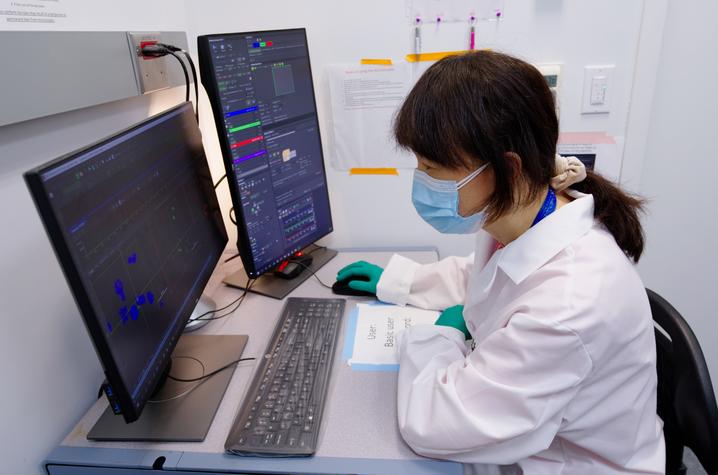Markey researchers discover new treatment target for triple-negative breast cancer

LEXINGTON, Ky. (Nov. 8, 2024) — University of Kentucky Markey Cancer Center researchers identified a protein that could be key to developing new treatments for triple-negative breast cancer.
Triple-negative breast cancer, which accounts for about 10-15% of all breast cancers, is an aggressive type of cancer that has limited treatment options and tends to have a worse prognosis for patients.
The new study, published in Molecular Cancer, reveals that a protein called NAC1 plays a role in helping triple-negative breast cancer cells spread by maintaining their cancer stem cell properties and altering the immune system’s response to the tumor.
These findings could open new doors for treating patients with triple-negative breast cancer, say the study’s corresponding authors Xia Liu, Ph.D., and Jinming Yang, M.D., Ph.D., both faculty members in the UK College of Medicine’s Department of Toxicology and Cancer Biology.
“This study implies NAC1 is a promising therapeutic target to simultaneously eradicate cancer stem cells and mitigate immune evasion,” the study notes.
The research team’s work found that tumors with high levels of NAC1 have enhanced cancer stem cell properties, making them more likely to resist treatment and spread to other parts of the body. The team also found that NAC1 affects immune cells called myeloid-derived suppressor cells (MDSCs), which can promote tumor growth by shielding cancer cells from the immune system attack.
The study could lead to new treatment strategies for patients with triple-negative breast cancer, including targeting NAC1 to kill the root of cancer, and restore the immune system’s ability to recognize and fight cancer cells.
This study’s findings are particularly significant because triple-negative breast cancer lacks the three most common targets for breast cancer therapy, making it harder to treat than other types of breast cancer.
Research reported in this publication was supported by the National Cancer Institute of the National Institutes of Health under Award Number R01CA221867. The content is solely the responsibility of the authors and does not necessarily represent the official views of the National Institutes of Health.
UK HealthCare is the hospitals and clinics of the University of Kentucky. But it is so much more. It is more than 10,000 dedicated health care professionals committed to providing advanced subspecialty care for the most critically injured and ill patients from the Commonwealth and beyond. It also is the home of the state’s only National Cancer Institute (NCI)-designated Comprehensive Cancer Center, a Level IV Neonatal Intensive Care Unit that cares for the tiniest and sickest newborns and the region’s only Level 1 trauma center.
As an academic research institution, we are continuously pursuing the next generation of cures, treatments, protocols and policies. Our discoveries have the potential to change what’s medically possible within our lifetimes. Our educators and thought leaders are transforming the health care landscape as our six health professions colleges teach the next generation of doctors, nurses, pharmacists and other health care professionals, spreading the highest standards of care. UK HealthCare is the power of advanced medicine committed to creating a healthier Kentucky, now and for generations to come.




